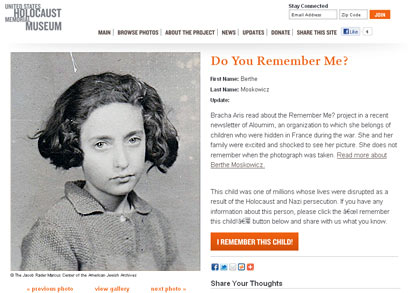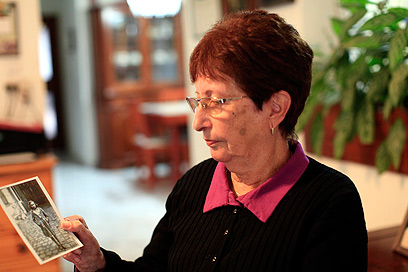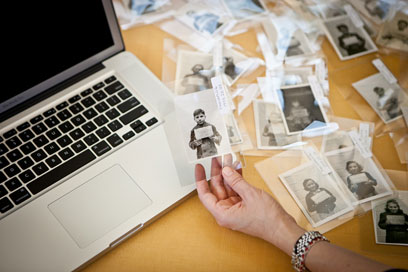
Orphan Berthe learns of Shoah days
Bracha Aris from Ashkelon knew nothing of her parents' fate after losing them as a child in Nazi-occupied Paris. After identifying her picture on US Holocaust Museum's website, she discovers new details from her past. Second article in 'Remember Me' series
A report about the "Remember Me?" project initiated by the United States Holocaust Memorial Museum, aimed at locating 1,100 children separated from their families, led her to the museum website, where she identified her picture.
"Berthe Moskowicz, eight years old," it said. "I knew it was me in the picture, that that was my former name," she says.
Ynet brings you her story in a bid to help find additional displaced children – the youngest Holocaust survivors.
- For further information and the full list of displaced children, visit the "Remember Me?" website at http://rememberme.ushmm.org/
Aris, 74, continued to browse through the picture excitedly, and quickly identified other children from the Paris orphanage in 1945, at the end of the war. Some of them still live in Israel.
"I called them all and informed them of the project. I also sent a letter to the project director at the museum in which I wrote the story of my life," she tells Ynet.
She doesn't remember when the photograph was taken. "My mind is blank. I understand it was meant to help find relatives after the war. In any case, I had nothing left. I was an orphan and had no family."

Berthe Moskowicz's photo on museum website
The Washington museum hopes the media coverage in Israel will help locate displaced orphans living in Israel.
In many ways, it's a race against time due to the survivors' old age. However, the project's director, Dr. Lisa Yavnai, says that every month the museum receives more than 1,000 appeals from people looking for their lost loved ones.
Father's name: Max?
Aris was born in Paris as Berthe Moskowicz, the daughter of Chana Moskowicz and Noah Flambaum, who immigrated from Poland to France in the 1920s. Because they were not French citizens, they were married by a rabbi in 1929 and she was given her mother’s maiden name.
In 1940, the Nazis entered France and the persecution of Jews began. Several months later, her father was taken to a local labor camp. Bracha never saw him again.

Aris. 'Perhaps the German felt sorry for me' (Photo: Roi Idan)
"I was only three. I didn't remember anything from my father, I didn't even know his name," she says. "When I arrived in Israel in 1948 and was asked for my father's name, I was ashamed to say that I don't know it, so I replied, 'Max.' since then, the name Max appears on my identity card under the 'name of father' clause."
Bracha, an only child, stayed with her mother two more years. On July 27, 1942, the mother received notice from the French police: "You must prepare to leave immediately."
"I remember that day very well," Aris recalls. "In July there was a big roundup of all of Paris' Jews. Mother received notice from the police to be prepared. She packed a suitcase and we went down to the concierge at the time we were told to.
"Two French policemen and a German officer arrived, and the German told my mother, 'Leave the child here; don't take her with you.' At first mother refused, but they told her that she had nothing to worry about and that she would be back in a few days. She left me with the concierge and disappeared.
"That's how I was saved. I have no idea why the German ordered her to leave me behind. Perhaps he felt sorry for me."

Orphans' pictures (Photo: United States Holocaust Museum)
When the concierge who was watching Aris realized that her mother Chana was not coming back, she handed the girl over to the city's orphanage. "I don't know how, but the people of WIZO (Women’s International Zionist Organization) learned of my story. Representatives from the French underground arrived, took me away and put me on a train to the village."
That ride on a train filled with German soldiers is something Aris remembers very well. "I was told to keep quiet and not to talk about what happened," she recalls.
The train stopped in the city of Nantes in western France, where a peasant riding a horse took Aris to a nearby village and handed her over to a family of Christian farmers who agreed to raise her in hiding. Aris lived in the village as a Christian and was even baptized in church and used cross herself.
"It later turned out that this village hid 36 Jewish children," she says. "The most amazing thing is that no one knew about the others. We were friends, we studied in the same school, but each of us kept it a secret."
'I waited for my parents, but they didn't come'
Aris lived in the farmers' home until the end of the war, when WIZO representatives arrived at the village to pick up the dozens of children hidden there.
"At first I refused to leave my new family," she recalls. But little Berthe was taken to the orphanage, with the hope that a family member who survived would come to pick her up. Her picture was likely taken in the orphanage.
In the first months after the war, survivors came looking for their children. That was probably the most difficult moment of her life. The days she waited, in vain, for her parents to arrive. "I waited for them like all the other children, but may parents never came back," she says.

Aris on backdrop of her old photo. 'I don't remember it' (Photo: Roi Idan)
She spent three years in the orphanage before immigrating to Israel in the Youth Aliyah in 1948. At first she lived in Ein Kerem and then moved to Kibbutz Dovrat in the north.
In 1954 she joined the IDF and served in the Nahal infantry brigade for two years. Four years later she got married and moved to Ashkelon. She has three children and eight grandchildren. Her husband passed away three years ago.
Aris hid her painful story from her family for many years. In 2000, following an inquiry of her past conducted by her friend for reparation purposes, she first learned what happened to her parents.
"She did all the work, went through France's official documents, and that's when I discovered that my father's name was Noah," Aris says.
A book published in France with the list of the Jews sent to Nazi death camps revealed the dates her parents were sent to Auschwitz. "That was the first time I officially knew that mother and father died in Auschwitz."
The new revelation of her picture in the Holocaust Museum project may expose new details from her family's life.
"The project manager did a great amount of research on my family and says she has found a lot of material on my aunts and uncles and cousins who I've never met. None of them survived the Holocaust.
"The only relative who survived death was my father's brother, who traveled to American 20 years before the war and lived in Chicago, but the research failed to find his roots."
Yitzhak Benhorin in Washington contributed to this report










